Majority of Americans Oppose Kavanaugh’s Confirmation
New polling shows that a majority of Americans are opposed to Justice Brett Kavanaugh's confirmation, but the vast amount of Republicans support it.
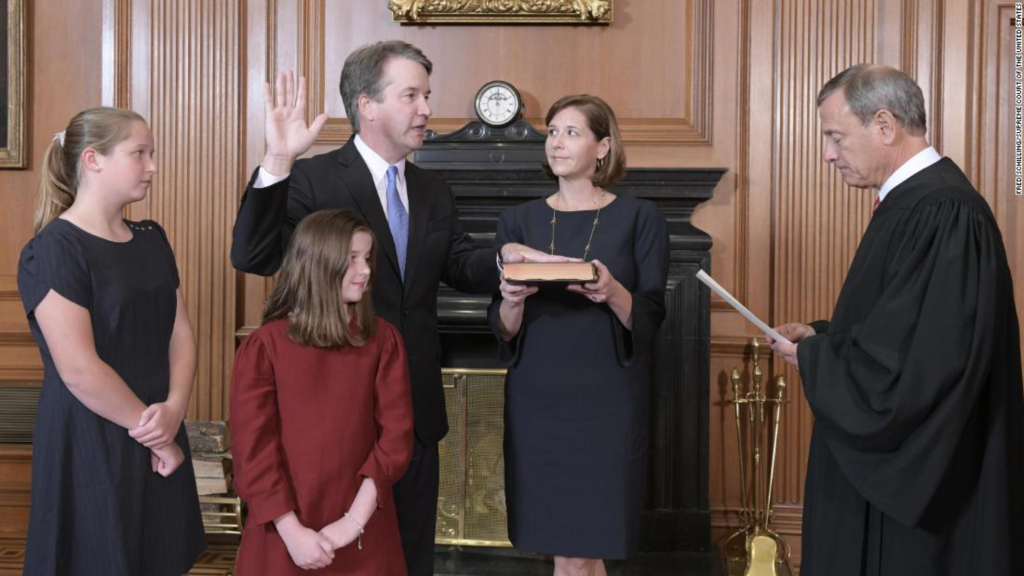
A new poll from CNN finds that a majority of Americans oppose Justice Brett Kavanaugh’s elevation to the Supreme Court, but that a majority of Republicans feel precisely the opposite:
The wrenching battle over Brett Kavanaugh’s nomination to the high court left the public with sharply negative impressions of the new Supreme Court justice and raised questions about his truthfulness, his temperament to serve and whether his partisan views would influence his work on the bench, according to a CNN poll conducted by SSRS in the final days of the fight over his confirmation.
Overall, 51% in the poll oppose Kavanaugh’s confirmation to the Supreme Court, up from 39% who opposed it in early September, after his initial confirmation hearing but before accusations of sexual misconduct emerged. Support for Kavanaugh’s confirmation has merely inched up, by contrast, from 38% backing him in early September to 41% now.
Much of that shift has happened among partisans, with both sides pulling further apart on everything Kavanaugh-related. Among Democrats, 63% opposed his nomination in early September, and that has risen to 91% in the new poll. Among Republicans, 74% backed him in September and 89% do so now.
The public’s take on Kavanaugh is much more negative than it was in early August, not long after President Donald Trump nominated him to fill the seat being vacated by Anthony Kennedy. Back then, 33% viewed him positively and 29% had a negative take. Now, nearly half have a negative view (47%) while 35% have a positive take.
Among Democrats, negative impressions of Kavanaugh have jumped 30 points, from 56% in August to 86% now. Positive views of Kavanaugh among Republicans have grown at the same time, increasing 18 points from 62% in August to 80% now. Among women, 53% now have a negative view, up from 33% in August. Men split evenly, 41% positive to 41% negative, but that’s still an increase in negative impressions compared with a 40% positive to 25% negative divide in August.
Shifts in impressions of Kavanaugh are coming most sharply at the extremes. The share who have a “very positive” view of Kavanaugh climbed from 17% to 24%, and “very negative” from 15% to 33%.
The last three weeks has also had a distinct impression on the public’s perception of Kavanaugh’s character:
All told, 52% of Americans say they believe the women accusing Kavanaugh of sexual misconduct over the judge’s denials of those accusations (38% said they believed him more than the women). And half (50%) said they thought he lied about his alcohol use as a young adult, more than thought he was telling the truth about it (37%). Half say Kavanaugh’s personal conduct has disqualified him to serve on the court, and 53% say his professional qualifications do not outweigh any questions about his personal conduct.
A larger majority, 56%, think Kavanaugh would be influenced by his personal political beliefs when considering cases before the Supreme Court. But the public was more evenly divided over whether Kavanaugh has the temperament to serve effectively on the court, 48% said he did not and 45% that he did.
Still, more say that Kavanaugh did face a “politically motivated smear campaign” (48%) than say he didn’t face such an effort (41%).
The extent to which public opinion about the Kavanaugh nomination changed over time, starting from the time that President Trump announced the nomination at a time when Kavanaugh was relatively unknown:
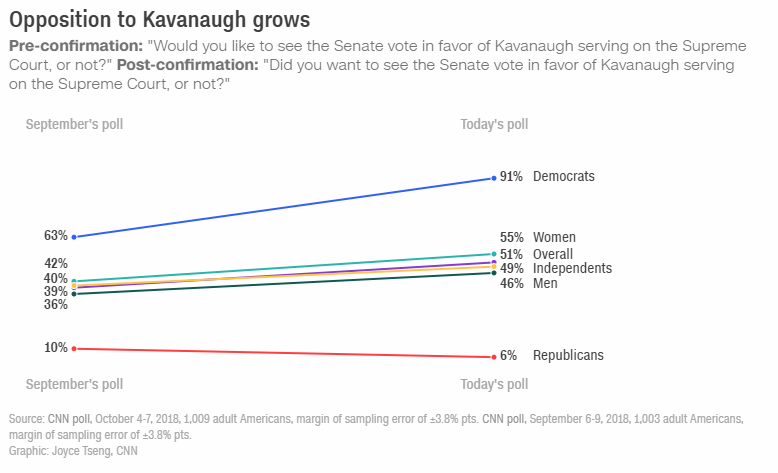
In other findings, the poll finds that a majority of respondents disapprove of the manner in which both parties handled the Kavanaugh confirmation hearings, most especially the accusations made by Dr. Christine Blasey Ford and other women against him. All told, 55% of the respondents disapprove of the way Republicans handled the matter and 56% disapprove of the manner in which the Democrats handled the accusations. This compares to early September, before the accusations were made public and indeed before the first round of hearings were even complete, 45% of respondents disapproved of the manner in which both parties were handling the confirmation process. This suggests that at least part of the reaction to how the parties acted during the hearings is based on general disdain for Congress as a whole. Of course, the poll also found that partisans on both sides had a higher disapproval of how the opposing party handled the process than they do of their own party. Among Independents, 53% of respondents said that they disapproved of the manner in which the GOP handled the hearings while 23% approved, as to the Democrats 58% of Independents said they disapproved of the manner in which that party handled the hearings while 30% said they approved.
On paper at least, this would seem to suggest that the Kavanaugh nomination will end up hurting the Republicans at the ballot box in four weeks. That very well may be the case, but the poll also explains why the President and Republicans are likely to do their best to keep the controversy stoked by the confirmation battle and the accusations that were made against Kavanaugh in the news. As much as the general public opposes the nomination, Republicans in general support it and see Justice Kavanaugh as the victim of an unfair political hit job. This is one of the reasons why the past three weeks have seen a significant increase in Republican base enthusiasm to vote in November to the point where the two parties are basically equal in that number. If the GOP can keep that enthusiasm going, then they may be able to stem the Democratic tide that some polls indicate may be approaching them. It may not save the Republican majority in the House, but it could make the difference in deciding whether or not Republicans maintain control of the Senate.


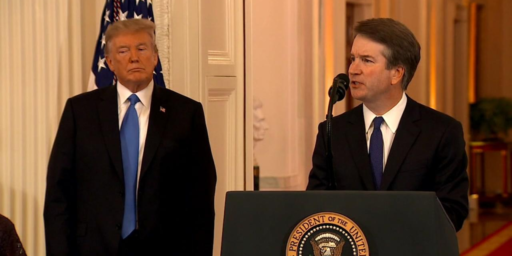
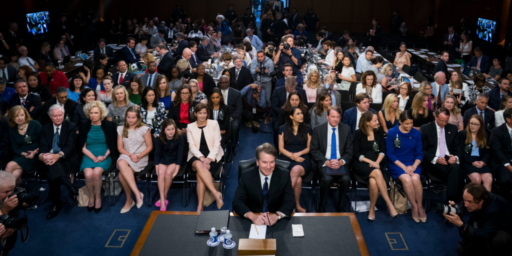
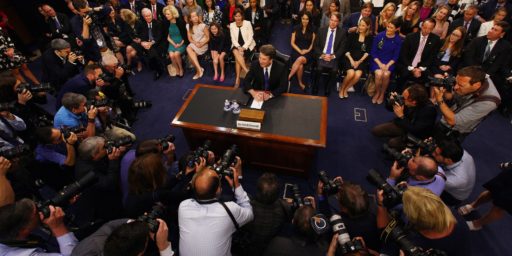
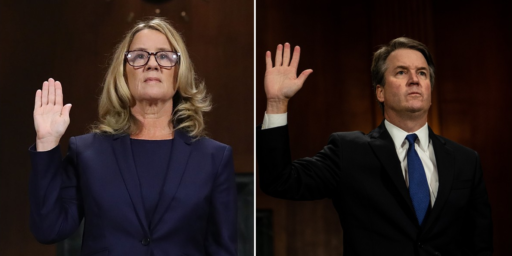
Representative government rocks.
The poll really doesn’t tell us much at all. Is there a subset that shows opinions by state or congressional district.
For example, Phil Bredesen, Democrat for Senate, issued a statement that he would have voted to confirm Kavanaugh in a, now exposed, ploy to gain votes of those who supported Kavanaugh’s confirmation. I understand it is different where a Republican candidate is facing a Democrat constituency. But the opinion opposing confirmation in NYC and CA districts is unlikely to matter to the election outcome.
In the meantime CJ Roberts has assigned complaints against Kavanaugh, from the 2nd U. S. Circuit Court, to the ethics council of the Denver-based 10th U.S. Circuit Court.
Funny how information about 15 complaints was kept from the public during the confirmation hearings.
But will you feel the same way in January when the House has a Democratic majority…
Of course it does…it tells us that most Americans are opposed to Kavanaugh’s confirmation…that isn’t an opinion you share, so you don’t think the poll tells us much…
It is the Hastert Rule in broader play – nothing matters other than that a majority of Republicans support something.
@Daryl and his brother Darryl:
To be fair, those complaints were filed as a result of his testimony (they pretty much allege that he lied and/or showed poor judicial temperament) and did receive media coverage as they were originally under the supervision of Garland.
I thought the Hastert Rule was to always keep at least 2 kinds of candy to lure the kids into the van.
@Teve:
No, that is the Hastert Policy. Different thing…
Of course both parties mishandled the process. That’s what political parties do. In the regular confirmation process, the party in the White House pretends every nominee is the equal of Oliver Wendell Holmes Jr. or Thurgood Marshall. The other party equates them with the worst shyster that ever lived.
Beyond that, the Democrats are either being truthful about the timing and conditions of Dr. Ford’s accusations, or are terminally incompetent. I say this because it made no sense to sit on the accusations until after the hearings were done. Why let Kavanaugh make a good impression first?
And then when things broke, to be fair, there was no way for either party to handle things well, short of withdrawing the nomination or postponing the confirmation vote until the next Congressional session. As Dr. Taylor reminded us just yesterday, the Democrats lacked the votes for either measure, and it’s evident the GOP wouldn’t want to.
Also to be fair, if we are going to criticize El Cheeto and his enablers and apologists for norm-breaking, which weakens the country and its institutions, we should also consider how brinkmanship also weakens the country and its institutions.
@An Interested Party: But will you feel the same way in January when the House has a Democratic majority…
Better than direct democracy.
Indeed…I wouldn’t want you or people like you to have a hand in democratic decision making…
46% to 45%
https://news.gallup.com/poll/243377/americans-closely-divided-kavanaugh-confirmation.aspx
@An Interested Party: Agreed.